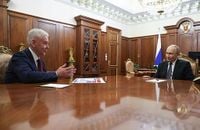Moscow Mayor Sergei Sobyanin met with Russian President Vladimir Putin on May 5, 2025, to discuss the socio-economic development of the capital. In a post on his Telegram channel, Sobyanin highlighted Moscow's impressive growth, stating, "Today I met with Vladimir Putin. I reported to the President of Russia on the results of Moscow's socio-economic development. Moscow is one of the largest urban economies in the world. In 2023, we moved to second place among the world's cities in terms of purchasing power parity. Last year, the economy maintained high rates of development - according to preliminary unofficial estimates, growth amounted to 5.5%. Over the past six years, it has increased by more than 25%."
According to Sobyanin, Moscow currently accounts for 21% of Russia's economy, solidifying its position as the country's industrial center. The capital has seen significant advancements in high-tech industries, with a range of new enterprises introduced last year aimed at replacing imported equipment. He noted, "It can be said that the jump did not happen by chance, but thanks to the efforts of recent years. During the pandemic, the IT sector burst forward. Information systems were then very in demand. Now the growth is even stronger - we are actively replacing imported software."
Investment in the city has been robust, with the total exceeding 8 trillion rubles over the last five years, primarily driven by the IT sector. Sobyanin reported that the turnover in this sector increased by more than 300%, while high-tech production grew by over 200%. He emphasized that there is good dynamics in investments, which have doubled in the last six years.
"Moscow's share in the country's economy is also significant. Yes, 21%, this is even without counting the financial sector. We are already the financial center of the country when they count GRP, the financial center is not counted. Approximately 600,000 people work in this sector, which is a significant part of the economy," Sobyanin added.
In addition to economic growth, Sobyanin outlined the city’s commitment to social programs, which remain a priority. The city plans to build 60 educational institutions annually and reconstruct hundreds of schools. Last year, college admissions surpassed 100,000, with a target of 150,000 students. Sobyanin noted that 95% of graduates secure jobs in their field and receive competitive salaries.
Moreover, this year marks the completion of the polyclinic reconstruction program, with plans to update hospitals in the next three to four years. The mayor indicated that the expected life expectancy in Moscow is now nearly 80 years, attributing this increase to advancements in the economy and healthcare.
Additionally, Sobyanin reported on Moscow's efforts to assist its twin cities, Donetsk and Lugansk, with construction and infrastructure projects. "If in previous years we were mainly engaged in engineering infrastructure, now a large amount of work will be carried out on urban infrastructure: improvement of public spaces, parks, roads, and streets. We will continue all this work further," he stated.
In summary, the meeting between Sobyanin and Putin underscored Moscow's significant socio-economic achievements and the ongoing commitment to enhancing both the economy and the quality of life for its residents. With ambitious plans for education, healthcare, and infrastructure, the capital is poised to maintain its position as a leading global city.


